COURAGE: the final installment in the
Curiosity, Compassion, and Courage 2020 Tour.
Curiosity pushes us to open the box, explore the myth, or initiate a conversation with someone we don’t understand.
Compassion brings an empathetic consciousness to what we find. Our decision to choose compassion is often harder than we expect.
How much easier it is — particularly now, in this uncivil era — to show anger, despair, or even disgust. How much easier it can be to simply walk away.
That’s where courage comes in.
American self-help guru Mark Manson, whom I discovered searching for images for this post (self-help is not my genre of choice), has this to say.
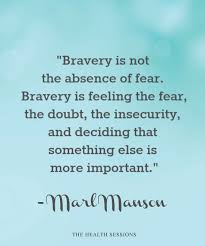
I chose this image because of this phrase:
“Something else is more important.”
Brené Brown has this to say about courage.
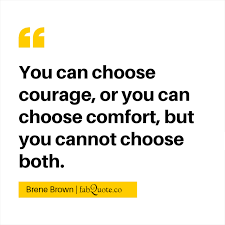
And certainly in that moment when someone has just said something we consider outrageous, despicable, or idiotic, how quickly we react.
We must “set the record straight.” We want to show them the “error of their ways.” Or we want to run. These reactions make us feel safe, comfortable, even superior. But they do nothing to help us bridge the gaps that are tearing our country apart.
If we are interested in finding a way to bridge these growing divisions, in holding a civil conversation, in understanding something you’d never thought of before, compassion can help us get there. And compassion in these situations requires courage.
Sir Winston Churchill says “Fear is a reaction. Courage is a decision.”
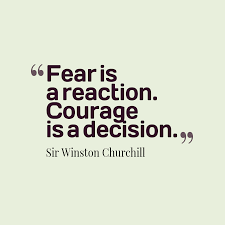
Nelson Mandela says, “Courage is not the absence of fear, but the triumph over it.”
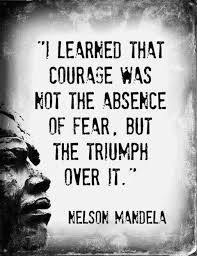
For Brown, Churchill and Mandela, courage is something we choose. Particularly when we’re afraid.
There’s another view of courage. This one is from Jesper Bugge Kold’s Winter Men, (translated by K. E. Semmel. 2014), a novel set in Hitler’s Germany, 1938.
Gerhard Strangl, the protangonist, is a university math professor who thinks a lot about courage. Here’s an excerpt from page 24:
Although Gerhard had all the prerequisites, the people of his generation were doomed to be cowards. The young had to be mobilized, and there was no better place to do that than the university, where he had a voice. He should educate them, give them the courage to voice their opinions. Should, should. If only there were more people like Weinhart, because it would take a large choir to rile up the country. He cursed himself. This was where he always got stuck. Courage. He simply lacked the courage. All his dreams of saying “enough is enough” of going away, of making a difference were a delusion. When would he learn? When would he recognize himself for who he really was?
He looked at the clock. It was time to go.
This view of courage, as something we either have or we don’t, is more common I believe. And, it can get us into trouble.
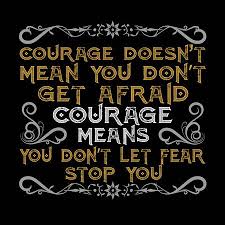
I like to believe we each have all the courage we need; it’s just sometimes hard to find, like for poor Gerhard Strangl, above. It gets buried under baggage we’ve accumulated (like the belief that we aren’t brave or, if we were brave, we wouldn’t feel afraid). And the result is we give up or give in; we choose comfort over courage. We sit in the familiar.
Our task in this life, I like to think, is to uncover those layers, embrace our inner demons, and act on our courage.
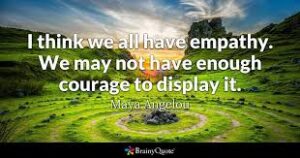
I think we all have empathy.
We may not have enough
courage to display it. Maya Angelou
During grad school, I was privileged to attend a talk given by Maya Angelou. I was even luckier when, because the room was so full, I was ushered to the stage with about twenty others to sit on the edge, dangling our feet while we listened. I wound up about 10 feet from the imposing force that was Ms. Angelou.
That night I heard her say “Courage is the most important of all the virtues.”
That was a first for me, and I remember I couldn’t buy it. Surely knowledge (we were in a university setting after all), honesty, truth, love, or mercy (pick one!) were more important. Any of those I would have understood.
Back then.
Over the years, I’ve remembered her words and eventually came to understand her point. And I now agree: courage is the most important of them all.
What is it about courage that makes it the most important?
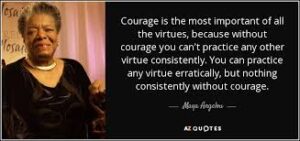
“Courage is the most important of all
the virtues, because without
courage you can’t practice any other
virtue consistently. You can practice
any virtue erratically, but nothing
consistently without courage.” Maya Angelou
“You can practice any virtue erratically,” she says, “but nothing consistently without courage.”
I’ve tried to weave these three Cs through all of my writings of late, so it should be no surprise that they turn up in my latest book, LEAPFROG: How to hold a civil conversation in an uncivil era. I’ve just released a second edition, rewriting one of the chapters with new information gleaned from a few Non-Violent Communication workshops. I hope you’ll take a look.
How about you? What’s your relationship to courage?
[box] LEAPFROG, my tiny handbook for handling those tricky conversations we all face, is now available in digital and paperback format.
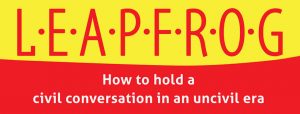
I’m participating in Amazon Affiliates, so your purchase through my website will enable me to make a wee bit more and not increase your cost at all. The above link takes you to the LEAPFROG page on my website (not yet accessible directly) where you can learn more about the book. To skip that page and go directly to the book’s page on Amazon, click here. Thank you.
[/box]
Arlene Smith
Courage makes me think of the Cowardly Lion. He had the courage all along, and as soon as he had a badge to verify it – some outside validation – he was good to go. Courage is not needing the badge.
Janet Givens
Yes, I love that story; he had enough all along. He just had to understand that, come to believe in himself. Thanks for adding that, Arlene.
Janet Givens recently posted…My Third C: Courage
Marian Beaman
I recall a line from LEAPFROG: “Civility does not mean the mere outward gentleness of speech cultivated for the occasion, but an inborn gentleness and desire to do the opponent good.” It takes courage to do that. As with similar posts, I’m guessing you enjoyed the research for this one.
On another note: How wonderful you got to see Maya Angelou at close range. I’ve always admired her courage and class. And her wisdom. 🙂
Marian Beaman recently posted…Wordless Wednesday: Shiny Red Shoes
Janet Givens
I do believe you are quoting Gandhi, Marian, from the front matter of the book. I quoted him along with the Dali lama and mark twain. Not a bad way to begin. Got your attention, certainly. Thanks for mentioning the book. It has suffered with CoVid, not sure all my speaking gigs and workshops will get rescheduled. Oh well; more time to write the next one.
Janet Givens recently posted…My Third C: Courage
Marian Beaman
Ha! Well, I have good taste in quotes.
I’m not sure how authors “gird up their loins” to write book after book after book. Maybe I’ll get my second wind one day. I’ve been toying with the idea of turning a scene of my story into a children’s book. (I already have the illustrator!)
Janet Givens
You certainly do. And it’d be a shame to have him go to waste now, wouldn’t it. 😉
Janet Givens recently posted…My Third C: Courage
Laurie Buchanan
Yes. Yes! This Maya Angelou quote:
“Courage is the most important of all the virtues because without courage you can’t practice any other virtue consistently. You can practice any virtue erratically, but nothing consistently without courage.”
Janet Givens
Laurie, I love it when something, some idea I’ve previously rejected, finally makes sense to me. So it is with Maya’s sense of courage. Good quote, huh.
Janet Givens recently posted…My Third C: Courage
susan scott
Mr Nelson Mandela ‘I learned that courage was not the absence of fear, but the triumph over it. The brave man is not he who does not feel afraid, but he who conquers that fear’. Dec 6, 2013
It’s Mandela month here in SA Janet … so I decided to add this quote. Lovely well considered article thank you. Hope all well.
susan scott recently posted…#WATWB education
Janet Givens
Thank you Susan for the continuation of the Mandela quote. Surely if anyone can speak of what courage is, it is Nelson Mandela. What does one say as you celebrate Nelson Mandela month?
Janet Givens recently posted…My Third C: Courage
Bette Stevens
Great quotes!
Janet Givens
Thank Bette. I thought so too.
Darlene Foster
I love this series of three words. The quotes you included for courage are perfect. Lucky you to have met Maya Angelou.
Janet Givens
Thanks so much Darlene. It was a series I’ve wanted to do for a while now. I learned a lot. And yes, I have felt very fortunate to be at that talk she gave.
Darlene Foster
I once heard Jane Goodall speak and met her at the reception after. I love these inspiring women.
Janet Givens
I heard her speak in Cleveland many years ago, but was pretty much in the back row. What a life she’s led. You’re right; we need these inspiring women — courage is contagious I’m told.
Janet Givens recently posted…More Musings in the Era of CoViD-19